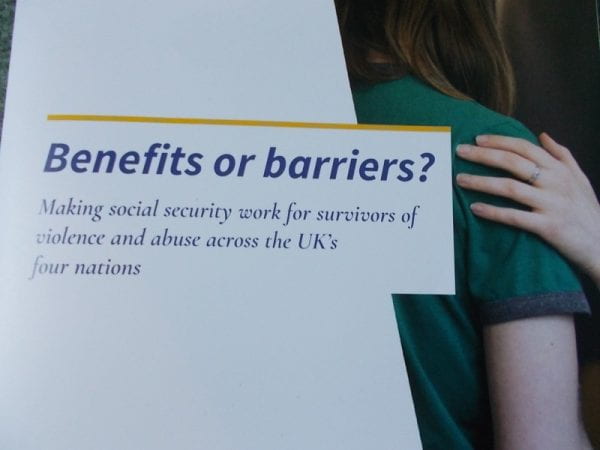
Marilyn Howard, University of Bristol
Supported by PolicyBristol, a report on social security and survivors of violence and abuse across the four nations of the UK was launched in June 2019.
Benefits or barriers? Making social security work for survivors of violence and abuse across the UK’s four nations was launched in the House of Commons at an event organised by the UK Women’s Budget Group, Surviving Economic Abuse and the End Violence Against Women coalition. Chaired by Sarah Champion MP, the event heard speakers representing organisations from Wales (Chwarae Teg and Welsh Women’s Aid), Scotland (Engender) and Northern Ireland (the Northern Ireland Human Rights Commission). Also speaking was a representative from the End Violence Against Women Coalition, ‘Eve’ (an expert by experience, talking about economic abuse) and Marilyn Howard from Bristol University, report author.
Social security failing to meet needs of survivors when living with an abuser, trying to leave or trying to set up in a new home
The report, which drew on workshop discussions with and information from academics, practitioners and civil society with expertise in gender, domestic abuse and social security, highlights that whilst social security should be a support to survivors at the time they need it the most, cuts and changes since 2010 have instead created barriers. Survivors of abuse and violence can find that:
- they are trapped with an abuser as they do not have the resources to leave (thus risking further harm), exacerbated by the Universal Credit single payment to a couple and the reduced availability of crisis support;
- if their immigration status means that they have No Recourse to Public Funds, they may find it difficult or impossible to find a refuge place;
- making a new benefit claim can be difficult if a survivor has fled without paperwork that can verify their circumstances, some having to wait twice as long for a Universal Credit claim to be paid (10 rather than the standard 5 weeks), and they can be worse off than under previous benefits;
- cuts to housing support threaten survivors’ chances of getting temporary or longer-term accommodation, as rents (especially in the private sector) are likely to be higher than Housing Benefit or Universal Credit will meet;
- cuts to local welfare assistance also reduce the help that survivors can get with furniture and white goods for a new home.
Some benefit rules (such as the two-child limit) have exemptions for domestic abuse or coercion; but these require a survivor to disclose abuse to job centre staff, provide proof of this and to meet other conditions.
Differences across the UK
Where you live can also make a difference to survivors’ journeys, even though much of the social security system applies to the UK as a whole. [i]
Scotland, Wales and Northern Ireland have different social contexts; different legal systems (England and Wales sharing a legal system); different devolution settlements and contexts; different approaches to violence against women and girls; and different public sector equality duties; all of which can affect survivors’ experiences.
For example the 2 child limit has a particular impact in Northern Ireland because: average family size is larger; there is a legal duty for anyone aware of a crime to report this to the police or face prosecution themselves; so the ‘rape clause’ exemption can make women choose between poverty if they don’t disclose, or criminalisation if they do
Inconsistencies
The report also highlights inconsistency between changes such as the introduction of Universal Credit and the UK Government’s strategy on violence against women and girls, notably the draft Domestic Abuse Bill, published in January 2019. For instance, the Universal Credit single payment can give the green light for abusers to exert financial and other forms of control over their partner.
The report was launched at the same time as the Joint House of Lords/Commons Committee published its report into the Draft Domestic Abuse Bill , recommending that the Government reviews the impact of its welfare reform programme on victims of domestic abuse. This builds on and echoes recommendations in ‘Benefits or barriers?’ for equality impact assessments to be undertaken when a policy is reviewed, changed or introduced, including gender analysis and impacts on survivors of domestic abuse.
Radical reform not tweaks
The report also recommends radical reform rather than just tweaking the system. Whilst abusers are responsible for their actions, policy can make a difference by narrowing the scope for abuse and signalling that abuse is not acceptable. Economic equality could be improved by:
- Reducing the scope of means-tests (for example direct provision of childcare rather than payments to individuals, reforming housing payments);
- Enhancing benefits paid on the basis of individual entitlement (contributory or non-means-tested benefits like Carer’s Allowance);
- Improving paid work options and employment-related benefits (such as Maternity Allowance and provision for maternity/paternity and parental leave)
[i] Social security is technically devolved to Northern Ireland, though this generally mirrors GB provision; 11 benefits have been devolved to Scotland, mainly disability and carer benefits; and benefits such as the former social fund have been localised.
